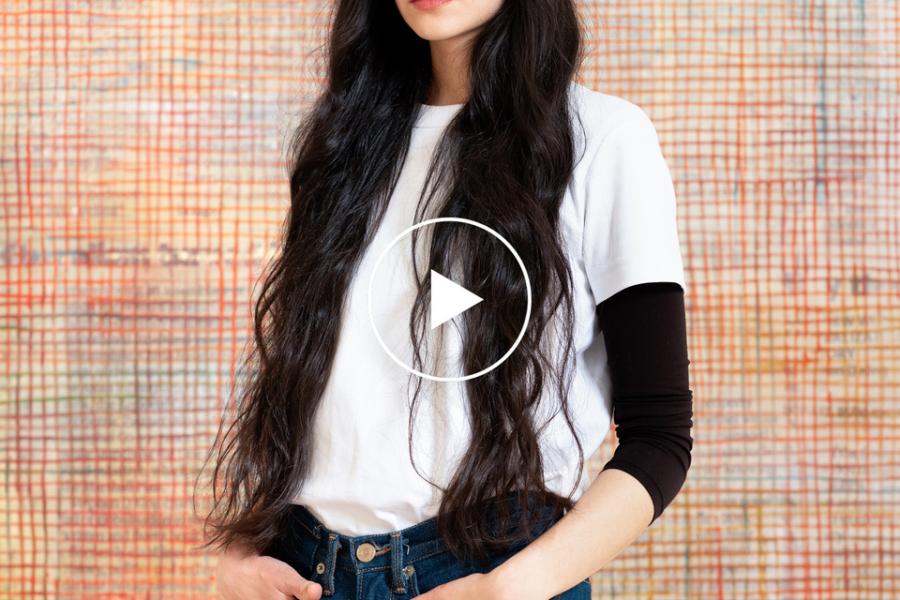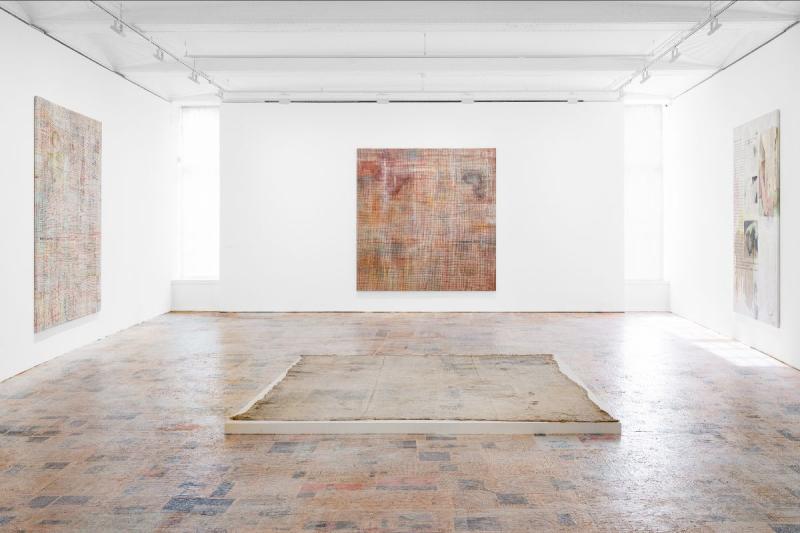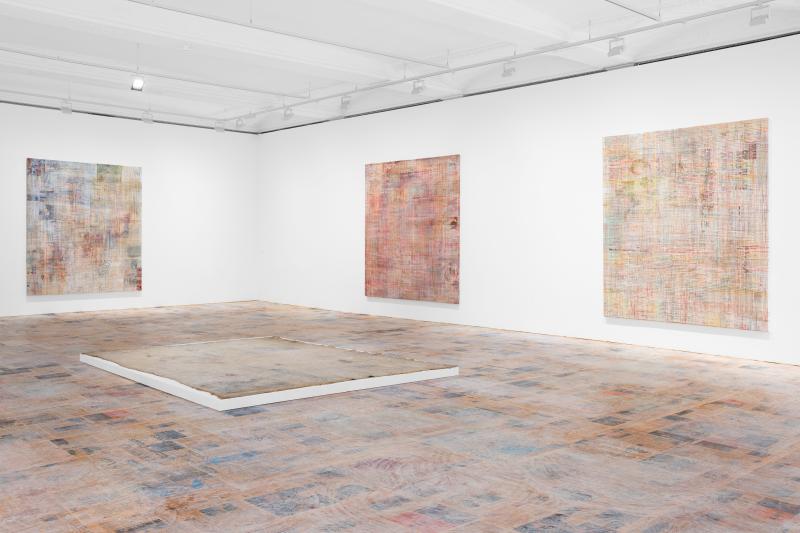Mandy El-Sayegh Joins Galerie Thaddaeus Ropac
 Mandy El-Sayegh portrait. Photo: Eva Herzog - Mit freundlicher Genehmigung von: ropac
Mandy El-Sayegh portrait. Photo: Eva Herzog - Mit freundlicher Genehmigung von: ropacWas: Ausstellung
Wann: 25.10.2020
Wo: Paris, Frankreich
Mandy's sensibility to the human condition, the subtle portrayal throughout her work of vulnerability, frailty and the layering of the spirit and the body, makes her a distinctive voice of our time. This sensibility is embodied in her art by the imagery itself, whether it is on the floor, the walls or on the canvas. These half-seen shadows of a world we can barely perceive reflect the times in which we live and we are immensely proud to be working with her. – Thaddaeus Ropac
For Mandy El-Sayegh a grid or the news of the day can become a palimpsest for painterly gesture and textual polemic. Layered as flat bed or wrap around environment her work offers profound reflections on the past and the present. Having been nominated for the Max Mara Art Prize and shown at Chisenhale Gallery this is a great and logistical step in establishing her as an important presence on the London art scene. – Iwona Blazwick, Director, Whitechapel Gallery, October 2020
Mandy El-Sayegh's multifaceted practice investigates the possibilities of materials and language through the layering of found fragments and a fascination with the grid, together with her family history, lies at the heart of her work. In her paintings, table vitrines, immersive installations and videos, she creates layered anthologies of found text and images that explore the production and circulation of information, as well as the systems that contain them. As the artist states: 'I’m interested in the erasure of meaning, or the accumulation of meaning through a layering system.'
Combining a range of sources including newsprint, advertisements, anatomy books, the names of military organisations and her father’s Arabic calligraphy, the artist creates ‘forms [that] bring about questions of legitimate and illegitimate readings of culture and context’, as well as the power structures that determine who legitimises such readings. El-Sayegh often places daily tabloid headlines alongside pages from the Financial Times, chosen both for its flesh-pink tone and stature as an authority on global finance. Untethered from their original contexts, these disparate fragments ‘move, they travel, they contribute to cultural hybridity rather than cultural homogeny’ and take on unexpected new meanings through their proximity. Moving between material, corporeal, linguistic and cultural frameworks, El-Sayegh draws attention to the constant flux of meanings and brings into question the perceived objectivity of language and the media.
In El-Sayegh’s Net-Grid canvases, the overpainted grid functions akin to a fishing net, capturing the detritus and nuances of popular culture, while simultaneously structuring and obscuring any reading. By emphasising the boundaries of her chosen medium, El-Sayegh's grids allude to the systems that shape how information is categorised, contained and understood.
The notion of corporeality is a crucial structuring principle throughout El-Sayegh’s work. In her site-specific installations, newsprint and silkscreened texts are plastered onto the walls and floor with layers of latex that suggest medical associations or tattooed skin. She refers to these collages as ‘suturing’ and to her painted surfaces as ‘skins’, so the metaphor of the body – heightened by her use of latex – grounds these elements in a universally recognisable register. ‘We all have bodies, regardless of our context, political leanings, or position in time’, although our individual experiences within those bodies are shaped by external systems that, in turn, affect how we make sense of the works.
As part of the gallery's programme of events for Frieze London 2020, El-Sayegh appeared in a panel discussion on 'Painting Today' alongside the artists from A Focus on Painting, Alvaro Barrington, Rachel Jones and Dona Nelson, moderated by the exhibition's curator Julia Peyton-Jones. Watch the conversation here.
The artist was also invited by curator Victor Wang to perform as part of this year's Frieze LIVE programme at the Institute of Melodic Healing. Watch the performance here.
BiographyBorn in Selangor, Malaysia, Mandy El-Sayegh lives and works in London, UK. Her first solo institutional show, the specially commissioned installation Cite Your Sources, was held at London’s Chisenhale Gallery in 2019. Her work has also been shown in exhibitions at the Sursock Museum, Beirut, Lebanon (2019); SculptureCenter, Long Island City, NY, USA (2019); The Mistake Room, Guadalajara, Mexico (2018); Instituto de Visin, Bogotá, Colombia (2018); Sifang Art Museum, Nanjing, China (2017); and the New York Art Book Fair at MoMA PS1, Queens, NY, USA (2016), among others. She was shortlisted for the biannual Max Mara Art Prize for Women in collaboration with the Whitechapel Gallery, London in 2017.
Tags: Malerei, Mandy El-Sayegh.
 Installation view, Mandy El-Sayegh, A Focus on Painting, Galerie Thaddaeus Ropac London, 2020. © Mandy El-Sayegh. Photo: Eva Herzog. - Mit freundlicher Genehmigung von: ropac / Galerie Thaddaeus Ropac Marais
Installation view, Mandy El-Sayegh, A Focus on Painting, Galerie Thaddaeus Ropac London, 2020. © Mandy El-Sayegh. Photo: Eva Herzog. - Mit freundlicher Genehmigung von: ropac / Galerie Thaddaeus Ropac Marais Installation view, Mandy El-Sayegh, A Focus on Painting, Galerie Thaddaeus Ropac London, 2020. © Mandy El-Sayegh. Photo: Eva Herzog. - Mit freundlicher Genehmigung von: ropac / Galerie Thaddaeus Ropac Marais
Installation view, Mandy El-Sayegh, A Focus on Painting, Galerie Thaddaeus Ropac London, 2020. © Mandy El-Sayegh. Photo: Eva Herzog. - Mit freundlicher Genehmigung von: ropac / Galerie Thaddaeus Ropac MaraisCopyright © 2025 findART.cc - All rights reserved





